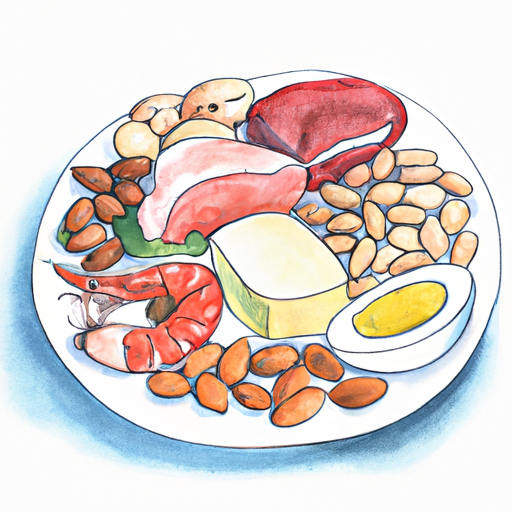In the world of fitness and bodybuilding, achieving muscle mass and strength is a common goal for many individuals. However, simply hitting the gym and lifting weights is not enough to see significant results. Diet plays a crucial role in gaining muscle mass and maximizing the effectiveness of strength training. In this article, we will delve into the importance of diet for gaining muscle mass, explore effective strength training techniques, and identify symptoms and causes of muscle mass deficiency. Whether you are a seasoned gym-goer or a beginner looking to build muscle, understanding the relationship between diet and muscle growth is key to achieving your fitness goals.
1. "Understanding the Importance of Diet for Gaining Muscle Mass"
Building muscle mass and strength through strength training is a goal for many individuals who are looking to improve their physical fitness and overall health. While strength training is essential for building muscle, it is equally important to understand the role that diet plays in achieving this goal.
A well-balanced diet that is rich in protein, carbohydrates, and healthy fats is essential for gaining muscle mass. Protein is especially important for muscle growth, as it provides the necessary building blocks (amino acids) for muscle repair and growth. Carbohydrates are also important for providing energy during workouts and aiding in recovery, while healthy fats help support hormone production and overall health.
In addition to macronutrients, it is important to pay attention to micronutrients such as vitamins and minerals that play a role in muscle function and recovery. For example, vitamin D is important for muscle strength and function, while magnesium plays a role in muscle contraction and relaxation.
Timing of meals and nutrients is also important when it comes to gaining muscle mass. Consuming a balanced meal or snack containing protein and carbohydrates before and after a workout can help support muscle growth and recovery. Eating regular meals and snacks throughout the day can also help provide a steady source of nutrients for muscle building.
Overall, understanding the importance of diet for gaining muscle mass is essential for anyone looking to maximize their strength training efforts. By incorporating a well-balanced diet rich in protein, carbohydrates, and healthy fats, individuals can support muscle growth, improve
2. "Exploring Effective Strength Training Techniques"
When it comes to gaining muscle mass and increasing strength, incorporating effective strength training techniques into your routine is crucial. Strength training involves using resistance to build muscle, improve endurance, and increase overall strength. Here are some key techniques to consider when designing your strength training program:
1. Progressive Overload: One of the most important principles in strength training is progressive overload. This means gradually increasing the intensity, volume, or frequency of your workouts over time to continue challenging your muscles and promoting growth. This can be achieved by increasing the weight, reps, or sets of your exercises.
2. Compound Movements: Compound exercises target multiple muscle groups at once, making them highly effective for building strength and muscle mass. Examples of compound movements include squats, deadlifts, bench press, and pull-ups. Incorporating these exercises into your routine can help you maximize your gains and improve overall muscle development.
3. Proper Form: Proper form is essential in strength training to prevent injury and ensure you are effectively targeting the intended muscles. Take the time to learn the correct technique for each exercise and focus on maintaining good form throughout your workouts. Consider working with a certified personal trainer to ensure you are performing exercises correctly and safely.
4. Rest and Recovery: Rest and recovery are essential components of any strength training program. Muscles need time to repair and grow after intense workouts, so be sure to incorporate rest days into your routine and prioritize getting enough sleep each night. Overtraining can
3. "Identifying Symptoms and Causes of Muscle Mass Deficiency"
Identifying Symptoms and Causes of Muscle Mass Deficiency
Muscle mass deficiency, also known as muscle atrophy, is a condition characterized by a decrease in muscle size and strength. This can be caused by various factors, including lack of physical activity, poor nutrition, certain medical conditions, and aging.
Symptoms of muscle mass deficiency may include weakness, fatigue, decreased muscle tone, and loss of muscle mass. Individuals may also experience difficulty performing everyday tasks that require strength and endurance. In severe cases, muscle atrophy can lead to mobility issues and decreased quality of life.
There are several potential causes of muscle mass deficiency. Lack of physical activity or exercise is a common factor, as muscles need regular use to maintain their strength and size. Poor nutrition, particularly inadequate protein intake, can also contribute to muscle atrophy. Certain medical conditions, such as cancer, HIV/AIDS, and neurological disorders, can lead to muscle wasting as well. Additionally, aging is a natural process that can result in muscle mass loss if not addressed through proper diet and exercise.
It is important to consult with a healthcare professional if you suspect you may be experiencing muscle mass deficiency. A thorough evaluation can help determine the underlying cause of the condition and guide treatment options. In some cases, a combination of strength training exercises and dietary changes may be recommended to promote muscle growth and prevent further atrophy. By identifying and addressing the symptoms and causes of muscle mass deficiency, individuals can work towards improving their strength
